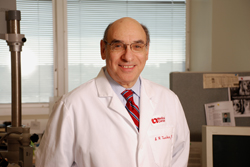 |
Irving H. Zucker, Ph.D. |
NOTE: Dr. Zucker and 26 the researchers who were named UNMC Distinguished Scientists or New Investigators for 2007 will be honored today during ceremony today at 4 p.m. in the Durham Research Center Auditorium. Each of these researchers have been profiled in UNMC Today leading up to today’s ceremony.
- Name: Irving H. Zucker, Ph.D.
- Title: Professor and chairman of the department of cellular and integrative physiology
- Joined UNMC: 1973
- Hometown: New York
Briefly describe your research in laymen terms, please.
Our lab is interested in the interactions between the nervous system and the cardiovascular system in diseases such as heart failure and hypertension.
What led you to pursue this area of research?
There are more than 500,000 new cases of heart failure diagnosed every year in the United States. The quality of life of patients with severe heart failure is minimal. It is critically important to understand the basic pathophysiological principles that contribute to deterioration of cardiovascular function and the function of other organs in the heart failure state. Our research evolved from a long standing interest in the mechanisms that regulate the cardiovascular system. Powerful neural reflexes keep blood pressure and blood flow at constant levels under normal conditions. When these reflexes are depressed or in some cases augmented, cardiovascular regulation breaks down.
How do you see your research contributing to science?
An understanding of the genetic, molecular, cellular and integrative mechanisms that regulate the interaction between the nervous system and the cardiovascular system will contribute to an overall comprehension of basic neural mechanisms. This knowledge will, hopefully, contribute to new therapies for disorders in which the sympathetic nervous system is abnormally activated.
Why did you become a scientist?
There are many reasons. Almost everyone who chooses a career in research has an innate curiosity of how things work. This was certainly the case for me. The potential for discovering something brand new, something that no one else in the world has ever seen or done is certainly a motivator. These moments are few and far between but when you have one, it provides the desire to continue. In research, you are only limited by your imagination and willingness to work hard. If one is creative and dedicated, all the other good things about the profession will follow.
What is your hope for the next generation of scientists?
The accomplishments of each generation build on the accomplishments of the previous generation. Science is more than technology. Science is a philosophy, a gestalt if you will. The next generation of scientist must use the current explosion in molecular and genetic biology to understand integrative and systems biology. It is important to always keep the “big picture” in view. We must understand that most of us will not win the Nobel Prize but all of our contributions are valuable.
Beyond grant funding, how do you measure success?
In academic circles success is often measured by grants and publications. In my mind a success in science is demonstrated by a sustained history of asking pertinent questions, carrying out careful, novel and creative research and passing the knowledge on to the next generation.
What would you tell a student interested in a research career?
I would lay out the pros and cons of a research career. But students should pursue a career that interests them; a career that they feel passionate about. If successful, the cons will melt away and the pros will be enormously rewarding. Research is only a career for the self motivated and the thick skinned.
Do you have a hero/role model? If so, what do you admire most about them?
There have been so many people that have influenced my career that it is hard to single out one person. For instance the great cardiovascular scientists of the 19th and early 20th century have influenced my thought processes and the way I approach designing experiments. Two of my previous mentors have been outstanding role models. Dr. Gabor Kaley who has just stepped down as chairman of the department of physiology at New York Medical College after 35 years is a great example of staying power and passion for research. At 81, he is working on his fourth renewal of his NIH Program Project Grant. Joseph P. Glimore, Ph.D., was my post-doctoral advisor and chairman of the UNMC Department of Physiology and Biophysics. He showed me how to work hard and to carry out experiments that answered relevant questions. Of course, my parents instilled a work ethic that I believe has done me well in this career.
Tell us about your family and hobbies outside of the lab.
I have been extremely fortunate to have been surrounded with five of the most spectacular and supportive women. They have been the loves of my life. My wife of 37 years, Judy, deserves much of the credit for my success. She even agreed to come to Nebraska 36 years ago! I take great pride in my three wonderful and loving daughters, Sherri, Dana and Lauren. My eternal gratitude must go to my mother who encouraged me to stay in school and work hard.
As far as hobbies are concerned, I like to travel and understand other cultures and I like music.
List three things few people know about you.
- I like to cook and I’m pretty good at it.
- I like to eat what I cook!
- I’m a big New York Yankee fan.